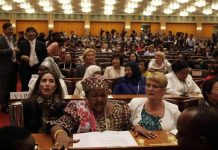Africa-Press – Tanzania. UPON examining the manifestos of various political parties participating in the General Election scheduled for October 29, 2025, a strong focus is evident on economic and investment issues, which are crucial for promoting economic growth.
Like its counterparts in the electoral arena, the United Democratic Party (UDP) has issued a document outlining its proposed actions if it ascends to power after the General Elections.
Upon examining the 78- page UDP manifesto, the initial observation is that the party’s five key priorities, including agriculture, industries, education, health and water, are systematically organised according to the government’s term duration, thereby facilitating the fulfilment of commitments during the leadership period.
Methodically, these priorities are arranged based on their importance and the urgency of their implementation, each linked to specific objectives and a series of actions.
However, there is a noticeable lack of discussion on how these priorities will be financed.
In juxtaposing this manifesto with those of other political parties, the UDP party endeavours to elucidate the rationale behind its prioritised focus.
For instance, the emphasis on agriculture is underscored by its role in employing over 65 per cent of Tanzanians and serving as the cornerstone of national economic advancement, particularly within rural and urban sectors.
To the economy, UDP’s viewpoint is that agriculture not only serves as a primary source of raw materials for domestic industries but also ensures national food security and possesses significant potential to broaden the tax base through enhanced production.
The party then believes that this, in turn, empowers the government to adequately meet the financial obligations associated with public servants’ salaries, thereby positioning agriculture as a pivotal force in combating poverty and establishing a competitive, self-sustaining economy.
In this context, it is important to recognise that the government’s financial obligations go beyond merely covering employee salaries.
In every country, there is a responsibility to fund public goods and services, which often lack the necessary incentives to effectively engage the private sector.
This party seems to lack a comprehensive understanding of the importance of public goods and the mechanisms for funding them to benefit citizens.
The rationale behind the second priority of the UDP and the manner in which it recognises the efforts made by the outgoing government is satisfactory. This is clearly evident in the UDP manifesto, which outlines the purpose of this priority.
For UDP, health has been placed as a secondary priority following agriculture, as productive agriculture relies on the good health of farmers and the broader community.
According to UPD, health is not only a fundamental right but also a crucial instrument for development.
Openly, UDP acknowledges that the previous government has taken various steps to enhance infrastructure and access to services, emphasising the need for ongoing development and strengthening in the health sector rather than merely implementing emergency measures.
The primary aim is to ensure that every Tanzanian can access quality healthcare without facing financial or geographical barriers.
In the third priority, UDP emphasises that selecting specific industries is a targeted strategy to develop an industrial economy dependent on domestic raw materials.
For UDP, agriculture will provide a solid foundation for producing raw materials used in the processing of various products.
This initiative aims to increase the value of agricultural products, expand employment opportunities, boost government revenue through value-added tax and strengthen the nation’s ability to market processed goods rather than merely selling raw materials as is currently done.
Ultimately, this will foster a resilient and competitive economy in both regional and international markets.
The UDP is aligning with the manifestos of other parties regarding the significance of education.
For the UDP, this priority is essential and will be executed thoughtfully and sustainably, aiming to review the entire education system from primary to higher education.
The focus, according to UDP, will be on the effectiveness of the curriculum, the learning environment, the quality of teachers, as well as enhancing vocational education and investing in science and technology.
This approach seeks to ensure that education serves as a tool for liberation, creativity and the development of a knowledge-based nation, while also preparing Tanzanian youth to be competitive in the modern job market.
Given that these changes are long-term and require substantial investment, they have been scheduled as the fifth priority—not due to a lack of importance, but because they are strategic rather than urgent.
Just like other political parties’ manifestos, the UDP has a comprehensive plan to ensure that every Tanzanian has access to clean, safe and sufficient water for domestic use, agriculture, livestock, industry and social services, both in urban and rural areas, if allowed to lead the country.
Establishment of sustainable water infrastructure – constructing dams, wells, water filtration facilities, tanks, pipelines and modern irrigation systems.
Effective management of water resources – safeguarding and conserving rivers, lakes, springs and groundwater to prevent depletion and pollution.
Regarding gender and social equity in water services, UDP plans to prioritise women, children and vulnerable groups due to the significant impacts they face from water scarcity.
Utilisation of technology and innovation, along with creative approaches such as rainwater harvesting, water filtration and storage solutions, as well as digital systems to monitor consumption, are some of the initiatives UDP intends to implement if the party wins the General Election and forms the government.
Section 15.13 of the manifesto, which focuses on International Cooperation, states that UDP will improve the enforcement of international agreements aimed at preventing money laundering.
It highlights collaboration with other nations to identify corrupt individuals who have fled abroad and further mentions that investigative information will be exchanged between local institutions and international organisations.
Section 18.7 of the manifesto, which addresses Employment Abroad, states that the UDP government will enter into employment agreements for youth with various countries (Gulf, Asia, Europe).
Through Tanzanian embassies, youth who have received specialised training (drivers, health workers, mechanics, teachers, etc) will be registered. While the concepts presented in these two sections are commendable, they are illustrative examples; the UDP manifesto falls short in articulating to Tanzanians the mechanisms through which it intends to enhance export trade relations, its approach to international agreements—particularly those addressing climate change —and its strategies for improving international relations.
Furthermore, it lacks clarity on its commitment to preserving Tanzania’s established reputation and position on the world stage. In summary, this manifesto offers admirable ideas.
Source: Daily News – Tanzania Standard Newspapers
For More News And Analysis About Tanzania Follow Africa-Press







